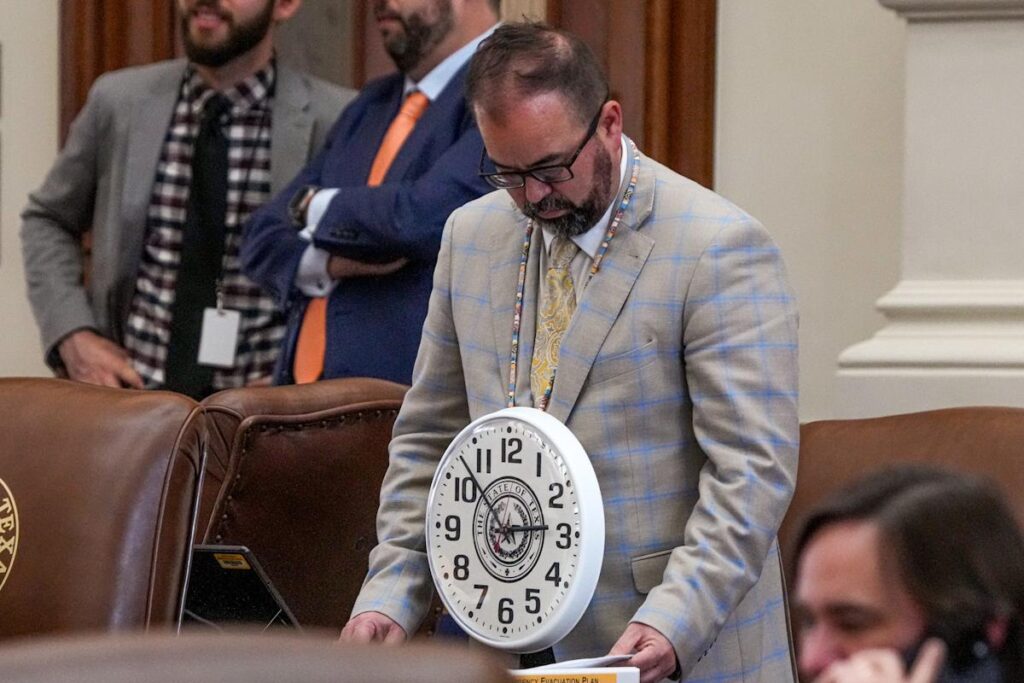Day 138 of the 140-day session of the Legislature resembled a volleyball game where the ball was the scores of bills trying to make through the process and the net was the Capitol rotunda that separates the House from the Senate.
Here are some of the highlights from Saturday’s action.
Both chambers agree on a $338 billion budget for 2026-27
Both Houses signed off on the $338 billion spending plan to fund state government for the two-year cycle that begins Sept. 1. The total — the product of negotiations and compromises hammered out by a House-Senate conference committee — was slightly more than either chamber proposed when each passed its own version of the budget.
Rep. Joe Moody wears a clock on the last day to pass legislation in the Texas House of Representatives chamber at the Texas Capitol on Thursday, May 15, 2025.
The spending plan, which is subject to certification by Comptroller Glenn Hegar, includes $65 billion for the state’s sundry education programs and $44 billion for health and human services programs.
Assuming that certification is granted, Gov. Greg Abbott can either sign it into law or veto it. A third option for Abbott is the line-item veto that allows the governor to redline individual appropriations if he chooses.
The budget represents an increase of 1.2% from the present two-year budget.
The document would also, to some degree, tap the breaks on Abbott’s border security plan known as Operation Lone Star, which so far has cost Texas taxpayers more than $11 billion since 2021. The 2026-27 budget would allocate $3.4 billion for border security. That’s down from about $6.5 billion proposed in the chambers’ earlier versions.
Now that President Donald Trump has returned to the White House, federal allocations for border security are expected to be stepped up.
SB 37 on faculty senates, core curriculum review clears both chambers
Both chambers have approved and sent to the governor, sweeping legislation that seeks to limit faculty authority over university governance. The bill also expands the governor-appointed board of regents’ control over core curriculum, degrees and hiring, and create an investigative office to handle complaints of noncompliance against universities.
The bill also includes provisions to initiate a review of all core courses to ensure alignment with workforce readiness and prohibits any required class from advocating or promoting the idea that one race, sex, religion or ethnicity is “inherently superior to any other.”
No cellphones in school a step closer to becoming law
Public school students would no longer be allowed to use cellphones in school under legislation that is now on its way to the governor.
House Bill 1481 would allow local school boards to decide how the law would be applied. Exemptions would be available for students who require phones for medical and personal safety purposes.
If Abbott signs the measure, students could not use their cellphones during the school day.
The rules governing the governor’s veto
Here’s how the Texas Legislative Reference Library explains the process by which the governor signs or vetoes bills that pass both chambers and arrives at his desk:
“Bills that pass the House and Senate are sent to the Governor to sign or veto. The Governor has 10 days (not counting Sundays) to return the bill to the Legislature with objection. If after 10 days the bill is not returned to the Legislature by the Governor with objections, the bill becomes law as if the Governor had signed it.
“If the Legislature has adjourned sine die, or if the bill is presented to the governor less than 10 days (not counting Sundays) prior to final adjournment, the Governor has 20 days (counting Sundays) after the final day of the session to sign or veto the bill. If neither action is taken, the bill becomes law without the Governor’s signature.”
The last day in the process this go-round is June 22.
This article originally appeared on Austin American-Statesman: Texas Legislature tries to pass last bills in the final weekend
Read the full article here


